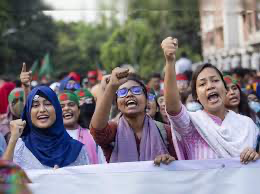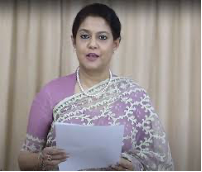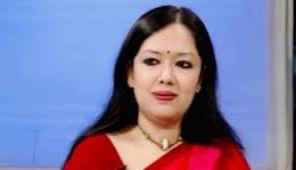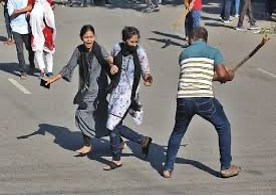#5: The Grain of Her Voice: Women in/around the 2024 July Uprising in Bangladesh
- Naveeda Khan
- Oct 20, 2024
- 13 min read
Naveeda Khan, Johns Hopkins University, 20th October, 2024
NB: This is the fifth in a series of responses following the events of July 2024 in Bangladesh. The rest can be found here.
In early July, Bangladeshis were mesmerized by the many media images of young women protestors in the streets of Dhaka, their diverse outfits signaling different degrees of conformity with societal and religious expectations. The TV channels, Jamuna TV, ATN, Somoy TV, Banglavision, interviewed them widely letting us hear their impassioned pleas for quota reform and see their fists raised defiantly against Sheikh Hasina’s various mischaracterizations of them. These energizing images were quickly followed by horrific images of their beating in the hands of the Chattro League, the youth arm of Hasina’s party, the Awami League. As Nusrat Tabassum, a prominent student leader was to say later in an interview, “it is an age-old strategy to have women at the front of processions to moderate violence against protestors. But this time, the Chattro League came especially for us, they directed the fullest extent of their violence at us.” Soon the state’s machinery targeted everyone indiscriminately, including children, through random-fire shootings from helicopters and tops of buildings. The pleas for reform changed into angry and anguished accusations of wrongdoing and the demand for Hasina’s resignation. The rest is, as they say, history.
On September 21, 2024, not two months into the era of reform ushered in by the mass uprising, Umama Fatema, another key student leader, called out the current government for not doing enough to restore law and order, complaining that “the female voice” was completely missing from government. Meanwhile, she reported, women activists were being subject to “cyber bullying and harassment,” and pressure was being put on them by their family to withdraw from the movement as “we have to continue to live in this society.” While she spoke, the young people surrounding her checked their phones, typed into their computers, looked around as if to see who else was there. She spoke in an angry tone, but it appeared to not call those around her. Shortly afterwards, Fatema posted a note on her Facebook account saying that she had resigned from her position as secretary of the Student Federation of Bangladesh, a left leaning organization created in 1985 to fight against General Ershad’s military dictatorship and that had played an organizing role in the July anti-quota reform movement alongside the Anti-Discrimination Students Movement group created in 2024, and that she had been honorably discharged from her duties. Fatema wished the movement well.[1]
There is much to inquire into here, most notably, why and how have the women been sidelined within a movement in which they had played such a big part? Given the generally positive orientation towards the movement by feminist groups, such as, Nari Pokho, and women labor activists, how are these groups working to ensure women’s continued participation in government, if indeed they are? And how vindicated does the Mahila Porishod feel? One of the largest and most established women’s organizations in Bangladesh, it had earlier been unpopular in its criticism of the student protestors for asking for the dismantling of all quotas, even those for women. As always these are open questions with the situation ever evolving.
In this short reflection, I return to an earlier moment to listen in on interviews with several women involved in the July movement, including several student activists, a politician, and a special advisor within the current government. I wish of course to contribute to recording their presence and participation within this important moment in the country’s history. But I am also interested in the grain of their voice, which, drawing on Roland Barthes, I understand to be the significance latent in their words before the point of its realization, that is, before we predicate the women’s actions through adjectives such as “successful” or “lacking.” My effort isn’t only to draw out the potential for new possibilities hinted at by the women, but also their sense that their actions may have ushered in a troubling newness that needed something further, but which was not yet clear. I end with some remarks on the frailty of women’s politics which lies in the fact that in seeking to change their own situation, they must of necessity change everyone else’s.
Opportunity vs. Equality: Nusrat Tabassum, Rafiat Rehnuma and Umama Fatema
In a Daily Star interview with three female students from Dhaka University, the interviewer made it a point of saying that she wanted to capture the student protests of July from the perspective of the women who took part in it. Her questions ranged from what motivated them to take part in what started as an anti-quota movement, a legitimate question given that quotas have been historically important for improving women’s standing in almost every country, to can they describe what happened during this long month, ending with, what do they hope for going forward? The women spoke easily, each building on the other’s response to give us a multi-faceted picture of the events of July.
Nusrat Tabassum, a female student in her mid to late 20s with a steady gaze on a strong face framed by long wavy hair, started off the conversation. She related how from the start of the anti-quota movement, meyera or the girls, as they referred to themselves, were the ones taking more initiative then the chelera or the boys. They got organized first, marching to Shahbag, a popular site of protests and close to University of Dhaka, the oldest public university in the country, every day and staying there till the end of the day, when they had to return to their halls before the gates to their hostels were locked. Initially, the male students, referred to as bhayera or brothers, mostly watched them from the sidelines and only slowly joined them.
Rafiat Rehnuma, the second of the students at the interview, also in her mid to late 20s with a soft gaze on a round face framed by a swathe of straight black hair, spelled out how the protesters knew one another through a prior history of petitioning the university for reforms on mundane issues, such as the food situation on campus or undue restrictions on women within the campus.
Umama Fatema was the third of those being interviewed. With a long face and hair held up in a bun by a rubber band, she appeared tomboyish in demeanor and had to be drawn into the interview several times. When she spoke, she did so from within the thick of things, referring to the residential halls where the women resided by name and assuming that her listeners knew of their various reputations for political activism, and to the July 10 blockade called by the Anti-Quota Movement (Boyishommo Birodhi Andolon) by the name given to it by its organizers, the Bangla Blockade, without any further explanation of these.
The conversation, lasting for about 40 minutes, had each elaborating on different aspects of the movement. They claimed that while they had all been involved in student organizing during their years in university, this was the first time that students from across Bangladesh had come together and almost spontaneously. They emphasized that nothing like this had ever before happened in the history of Bangladesh, marking the singularity of the July uprising.
Contradictions sprang up in their speech almost from the start. When asked why women would agitate for the removal of all quotas, including quotas for women for government jobs, Nusrat Tabassum said, “we women do not any longer think of ourselves as left behind people (pichiye pora manush). We do not feel that we must be given preferential treatment. We want to have equal access to everything. And that means a fight for shomota or equality rather than shujog or opportunity.” But then she almost immediately qualified herself: “Of course, this demand for equality is not the same for women in other parts of the country, those who have been left behind.”
This qualification produced a split in her discourse, between the women in the movement who demanded equality and those women who deserved development, between an inside and outside, between claiming one’s rights and receiving a helping hand. Later she expressed her dismay and disdain for the university officials who she claimed were the guardians of the women, entrusted to take care of them by their fathers and mothers, and who still turned them out of the halls to the caprices of the city at the command of the fascists (fashibad), in referring to the government. In other words, she felt that the university officials ought to have acted like they were the women’s caretakers, which is hardly the expectation of women seeking to be recognized as autonomous subjects. And in her ending comments on what she wished for in the future, among her wishes were the improvement of health services for women and children, and the protection of women from violence. Are then the woman for themselves, for others or others for them?[2]
Umama Fatema provides us an image that captures yet another uncertainty enshrouding the female student as autonomous subjects. Mind you, there is no doubt that the women were activists and equal participants in the movement. The uncertainty that I am trying to draw out has to do with what difference being a woman makes to such activity. She describes a moment after the Chatro League has afflicted violence on all the students on July 15, the students retreated to their halls to absorb the shock of the violence that they had just faced, take stock of the loss of their fellow students, lick their wounds, and sing songs to express their pain at what they were experiencing, a scene also described by Rafiat Rehnuma. The female students decide that they will march at night.
Previously they had been returning to their hostels before the gates were locked. Now they streamed out of their halls to the locked gates. As Umama Fatema describes it, the elderly gatekeeper unlocked the gates with shaking hands letting the women march into the night. This is an interesting moment for many reasons. First, there is the women’s affront, as if felt for the first time, that they were locked in every night. Later, as we know from Nusrat Tabassum, they would feel very bereft being turned out of these very halls. Then, the gatekeeper’s response to the presence of the women at the gates. In Umama Fatema’s rendition, he is drawn as a character sympathetic to their struggles. But he is also a gatekeeper facing not just a group of women breaking the rules for a greater political cause, but a crowd with the potential for violence. The sheer physical strength of the crowd was made evident to me walking across the Progati Shoroni road after a day of encounters between the student agitators and the police, when I saw that all the metal rods of the long railing dividing the two lanes of the road were missing, pulled out from their frames by the crowd as impromptu weapons against the police. Were then the women becoming a crowd?
I No Longer Feel Safe in This Country: Rumin Farhana
During the protests in July, the media was taking aside all different people to ask them about their participation, what was bringing them out even though such participation ran the risk of both targeted and random violence. They were particularly excited if they found a known face amidst the crowd, specifically politicians. Rumin Farhana was among those who was interviewed as she tried to wade into the crowds. A lawyer and a member of the Bangladesh Nationalist Party, started by General Zia, she was clearly loved by the camera for her striking looks, with a fair round face, heavily kohled eyes, lips boldly painted and long hair streaming behind her, and her general feistiness. She didn’t disappoint. She retorts, “I am not here today to represent any group. I am here today as a guardian, shocked at the violence being perpetrated by the fascist government upon our children. I am here in solidarity with their struggle against this government.”
This was very clever rhetoric because it kept the focus exclusively on the students, refusing to allow for state narratives that the students were being instrumentalized by other political parties and further hidden forces. And it was doubly entertaining to those watching as Rumin Farhana was effectively taking the role of a mother, despite being a single woman, who repeatedly parried questions about her single status by embracing it. She was now framing herself as Mother Bangladesh.
After July, Rumin Farhana has remained a favorite of the media. There is a hilarious clip of her giving a speech to BNP party members in which she speaks in very colloquial Bangla narrating how Sheikh Hasina flew the coop to the raucous laughter of the people gathered. She narrates: “Sheikh Hasina thought she would stay in power till Qiyamat (end times). She had to leave with just the clothes she had on. She couldn’t leave with even one more outfit…” And the skillful code switching is also evident in her appearances in various roundtables hosted by the news channels in which she is asked to elaborate on the state of the country under the advisory government and in which she draws upon her legal background to discuss the weak foundations upon which the government is operating. In a RT discussion shortly after the fall of Hasina’s government, she makes the point that such weak foundations do not bode well for being able to curtail the law and order situation threatening to overwhelm the country with the absence of the police from the streets and the rise of mob justice against Hasina’s party members and their families.
Amidst these various personas that Rumin Farhana dons, the most poignant was one most recently with her in which she is clearly referring to her unusual subject position as a single woman politician with a ribald side when she denounces the direction the government is going by saying that she no longer feels safe in this country. It is not clear who or what she means that is causing her to feel unsafe, but it is clear that she means that the space, which existed for her to be the person that she is, is shrinking.
There is Fascism Within Us: Syeda Rizwana Hasan
Among the handful of women who are in the interim advisory government is the very heroic Syeda Rizwana Hasan, a lawyer who has long waged a battle to make the rights to the clean environment intrinsic to human rights as part of the Bangladesh Environmental Lawyers Association (BELA). She now has the role of Minister of Environment, Forest and Climate Change. Always dressed in tasteful saris and adorned by a ubiquitous string of pearls, with her hair nice coiffed and a half smile never too far from her lips, Rizwana Hasan comes across as a confident and reassuring leader. I have loved hearing her speak on a variety of issues from the dispute over water with India and the state of the floods plaguing Bangladesh to communal violence against Hindus and more recently the rise of mob justice across the country. In wondering why, it occurs to me that this may be because she often speaks in a studied manner, backing her claims and analysis with evidence or at least reference to the existence of such evidence, making her legible to me as an academic. She has also been very consistent in terms of her persona and speech across diverse settings and diverse issues.
But there is one interview with her at which I got stuck and wondered why I was stepping back from my readiness to give her my trust. Rizwana Hasan is asked about the situation of violence by crowds across the country. She makes an important observation, that getting rid of a fascist government doesn’t rid the country of fascism overnight. There are of course those who are from the Awami League who were once part of the official structures and who are still inciting trouble. But those who turn against the Awami League and extract vengeance are also imbricated in fascist structures. And then she says, “all of us have been living with fascism for a long time and have had to adapt. Our own thought and speech are not free…There are fascists amongst us so we must clasp one another’s hands and hold steady.”
While what Syeda Rizwana Hasan is saying is undoubtedly true, after all, many of us naturalized Hasina for the 15 years in which she ruled, thinking of her as inevitable, and only intermittently attending to the violence her government was wrecking on people’s lives through extrajudicial killings, forced disappearances, Machiavellian politics of playing parties off one another, and the total capture of the economy. Yet Hasan’s move to locate a little fascist in all of us is a little too reminiscent of the Pakistan government’s effort in the 1980s to locate the non-Muslim or the hypocrite within its populace, which, as I show in my book, Muslim Becoming: Aspiration and Skepticism in Pakistan engendered a rampant doubt towards one another among Pakistanis. While Hasan may be asking for self-reflection, to locate this foreign within oneself, the orientation to sense out, locate and disinter a foreign element within each person is contagiously outward looking. At the same time, I take comfort in her words in the same interview, that “we must speak a lot and listen a lot” as such a profusion of speech is warranted after the deep silence that has prevailed.
Concluding Remarks
We have then a clutch of Bangladeshi women amid a churn. The grain of their voice, which I have located within the unsaid, the implicit, the contradictory, the protean, the self-reflective in their speech, suggest some ambiguity as to whether the women were thinking of themselves or even looking out for themselves through their participation in the July movement. They also became something else at various points of their participation than who they perceived themselves to be. Maybe they expressed a potential for violence among themselves in learning to be a crowd, and not just a procession. In the aftermath of the July uprising, they are left uncertain whether the churn will be good for women and what difference the fact of them being women made to the movement. As Franz Fanon reminds us in A Dying Colonialism (1959), women must take to struggles on behalf of everybody. But I still wonder if by taking the voice of everybody, such as risked by the Bangladeshi women protesters and even to an extent Syeda Rizwana Hasan, they risk their own? I am very interested to follow their individual trajectories and urge all of us to pay attention to this dimension of an evolving and what I believe to be a self-correcting process of change.
[1] It is rumored that Umama Fatema is about to join the other students in the advisory government. As a friend commented, her outspokenness could be seen as both critiquing the interim government and as “auditioning” for a role in it. Another has pointed out that this exclusion of women from the center is datable to August 5 as evidenced by the way the women who went to greet Mohammed Yunus at the airport were seen to be subtly pushed to the margins of the students gathered and hardly appear in any of the photographs of him. See https://en.prothomalo.com/bangladesh/unf6asfayl, https://www.rtvonline.com/english/bangladesh/15948
[2] I do not feel that there is a similar uncertainty for the male students involved in the movement, they were agitating for themselves.






Comentários